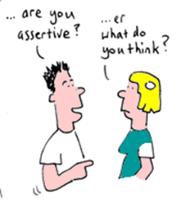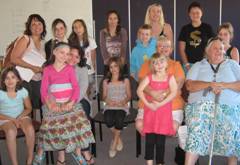|
The way we think is arguably the greatest influencing factor over our life's success or failure. The last edition of Insight (Winter 2009) commenced with Part 1 of 'The Secrets of Success' discussing the life-long benefits of positive self talk and practical strategies to recognise and replace negative thoughts, or 'stinkin thinking', with positive self talk. This article will follow the theme as we explore the value of affirmations to develop a habit of positive self talk.
Affirmations:
One way to reprogram your self-talk is by repeating positive affirmations until you begin to get a good sense of what positive thinking really sounds like. What we most often tell ourselves can become a self-fulfilling prophecy. If you want to explore the power of positive affirmations, follow these guidelines.
- Personalise your affirmations with words like "I," "me," and "my." You can't always control circumstances or other people, so make your affirmations about what you can control - yourself. Make your affirmations state your own goals, wants, and values, not someone else's.
- Some authors suggest affirmations are best stated in the present tense, because, if affirmations are in future tense ("I will...") your subconscious mind feels no urgency to act NOW. If you feel hypocritical stating affirmations in the present tense (as in "I am slender and healthy") then state your affirmations as a process (as in "Each day I am becoming more slender and healthier.")
- Make your affirmations believable and realistic so that you can say them with sincerity. Begin with small, easily achievable goals, and work your way up to bigger accomplishments. "My self control is perfect." is probably more believable as "I have self-control most of the time."
- State affirmations in the positive. To say "I am not shy and intimidated," only focuses your attention on the behavior you want to avoid. Instead say "I am confident and self-assured”.
- Make affirmations short and easy to remember. Catchy slogans stay with us longer than essays.
- Repeat your positive affirmations often and positive thinking will become routine.
To maintain positive self-talk, fill your mind with uplifting ideas. Recognise your strengths. Comfort yourself when things go wrong. Let your self-talk be like the soothing, supportive words of a counsellor, friend, or mentor. Remember, positive self talk leads to constructive behaviours and results in lasting accomplishments!
Personal Safety Australia awareness sessions and workshops cover a range of strategies to promote safety and wellbeing, including positive self talk. Contact us for further information.

Believe in yourself
References:
Pearson, Judith E 2009, Develop the Habit of Healthy Self-Talk! (online). Available: http://www.theselfpages.tripod.com/id44.html. [Accessed 16 June 2009].
Kolezynski, J 2009, Belief, Self Talk and Performance Enhancement (online). Available: http://www.selfhelpmagazine.com/articles/sports/ selftalk.html [Accessed 16 June 2009].
Along with positive self talk (as discussed in the previous article), much of our life’s success, safety and happiness can be derived from being assertive. As self-help guru Anthony Robbins argues, ‘The way we communicate with others and with ourselves ultimately determines the quality of our lives’. If we use assertiveness skills in our daily communication with others - our partners, family, friends and work colleagues - we will enjoy healthier relationships, are less likely to be victimised and will live life to the full! Who wouldn’t want to be more assertive?
Assertive communication involves expressing ourselves honestly and directly with self respect as well as respect for others.It involves standing up for your own
rights, while acknowledging the rights of others, and working towards a win-win solution.
Assertiveness has been an essential component of many Personal Safety Australia (PSA) workshops, however it is now available as its own workshop, ‘Assert Yourself for Safety and Happiness’. This 2 – 3 hour workshop, depending on client needs, aims to equip participants to develop assertiveness skills to maximise their safety and enhance their wellbeing and happiness. It includes the following topics:
- Assertiveness self assessment: a short individual activity to provide an indication of participants’ current level of assertiveness skills.
- What is assertiveness?: Exploring passive, aggressive, passive-aggressive and assertive communication styles and how they are applied in different scenarios.
- Benefits of assertive communication: Identifying the broad range of personal and professional benefits of being assertive.
- Developing assertiveness skills: Revealing the four essential ingredients for developing assertiveness skills together with general guidelines, the assertiveness formula and contingencies to deal with set-backs.
- Practical application: Applying assertiveness principles to a variety of commonly-experienced scenarios.
- Action Plan: Encouraging participants to commit to enhancing assertiveness skills by developing an Action Plan to set measurable, achievable goals within a set timeframe.
- Teaching children to be assertive: general guidelines to encourage assertiveness from an early age.
- Assertiveness Quiz: a fun and interactive way to recap the workshop’s key points.
For more information or to book an ‘Assert Yourself for Safety and Happiness Workshop’ please visit our website (see ‘Safety for Everyone’) or contact us.

Teenagers, and increasingly ‘Tweens’ (children aged from 9 – 12 years of age), face some of the most challenging times of their lives. They are going through rapid physical and emotional changes. Their self esteem and safety are often compromised as they strive to become more independent while longing to fit in and be accepted.
In 2008 Personal Safety Australia (PSA) developed the ‘Just for Girls’ and ‘Just for Guys’ Workshops for a client who requested gender-based training to provide practical safety strategies for teens and tweens and their parents/carers. The success of these workshops has led us to make the workshops available to all clients.
As you may have gathered from the workshop titles, the workshops are conducted for either all girls or all boys. Mothers or female carers (or fathers, if the single parent) are invited to attend with the girls, and fathers or male carers (or mothers, if the single parent) are invited with the boys. The workshops are facilitated by a presenter of the same sex as participants, to encourage participants to talk more freely about their safety and wellbeing concerns.
Each workshop is for 1 – 2 hours, depending on client needs, and aims to equip participants and their parents with a handful of key strategies to maximise their safety, enhance their wellbeing and encourage them to reach their full potential. The four key messages of the Safe Start: Protective Behaviours for Children and Young People program are explored, as they relate to young people:
- I am special/awesome/important, so are you!: to build a healthy self esteem and encourage respect and empathy for others.
- Safety is my right: to identify and effectively respond to potentially unsafe situations, including bullying.
- My body, my say: to identify, prevent and stop all forms of abuse.
- I can get help: to access help from trusted adults and relevant organisations.
The involvement of parents and carers has a number of benefits including: encouraging open communication with their son or daughter; an increased awareness of the pressures and safety risks faced by young people; and, most importantly, strategies to support their child to be as safe, happy and successful as possible.
For more information or to book a ‘Just for Girls’ or ‘Just for Guys’ workshop please visit our website (see ‘Our Services for Youth’) or contact us.

'Just for Girls' Workshop participants at Ipswich (September 2009)
“It is a fact that child sex offenders are online right now. They are not only creating and distributing child exploitation material, but are actively seeking out children to engage with and in many cases, trying to meet them." This is the grave warning to all parents from Queensland Police Service (QPS) Detective Superintendent Peter Crawford. Child sex offenders have proven exceptionally skilled at exploiting new modes of communication to gain access to children.
As part of this month’s (September 2009) Child Protection Week events, the QPS has released an updated edition of the popular ‘Who’s Chatting to Your Kids’ publication, billed as a must-read for parents of children with internet access. The publication is now complemented by a DVD, which includes interviews with child sex offenders and victims, to help educate parents of the risks associated with children using the internet.
The “Who’s chatting to your kids?” campaign was created by the State Crime Operations Command Taskforce Argos, a team recognised for apprehending child sex offenders online and the identification and removal of children from harm. The QPS has added a number of new sections to this edition to keep up to date with advances in technology and the subsequent safety concerns regarding: instant messaging; 3D interactive communities; sexting; and online gaming. The publication also includes a sample ‘Family Internet Safety Agreement’, which provides parents with recommended terms of their children’s use of the internet within the home and elsewhere.
The DVD is a police resource to be presented by police to the community. It contains interviews with two convicted child sex offenders, a 16-year-old victim (targeted online when she was 13), her mother and the mother of another 13-year-old girl targeted online. All of these cases occurred in Queensland. Also included in the DVD are interviews with a member of the Taskforce Argos covert internet unit, Detective Inspector Jon Rouse and expert Criminologist Professor Richard Wortley. The DVD is available to be presented by Child Protection Investigation Unit officers, Crime Prevention officers and School-Based Police Officers.
Any school or community group wishing to register their interest in receiving the “Who’s Chatting to Your Kids?” DVD presentation should contact their local police station or Crime Prevention Unit. The publication and “Family Internet Safety Agreement” are freely available via the QPS website: www.police.qld.gov.au

| References: |
| Viewnews.com 2009, Taskforce Argos helping parents protect children from child sex offenders online (online). Available :http://viewnews.com.au/bm/news/state-news/taskforce-argos-helping-parents- protect-children-f.shtml [Accessed 25/9/09]. |
Queensland Police Service 2009, Who’s Chatting to Your Kids? (online). Available: http://www.police.qld.gov.au/Resources/Internet/programs/ personalSafety/documents/Whos%20chating%20to%20your%20kids.pdf
[Accessed 25/9/09].. |
How often do you let other people's garbage change your mood?
One day I was in a taxi on my way to the airport to board a flight. We were driving in the left lane when, all of a sudden, a black car sprang out of a parking space right in front of us. The taxi driver slammed on his brakes, skidded, and missed the back bumper of the other car by just millimetres! And get this, the driver who'd almost caused a big accident, whipped his head around and he started yelling and gesturing rudely at us.
My taxi driver just smiled and waved at the guy. I mean, he was friendly. So, I said, "Why did you just do that? This guy almost ruined your car and sent us to hospital!" This is when the taxi driver taught me what I now call 'The Law of the Garbage Truck'.
"Many people are like garbage trucks”, he said. They run around full of garbage...frustration, anger and disappointment. As their garbage piles up, they need a place to dump it and sometimes they’ll dump it on you. Don't take it personally. Just smile, wave, wish them well, and move on. Don't take their garbage and spread it to other people."
So this was it: The "Law of the Garbage Truck." I started thinking, how often do I let garbage trucks run right over me? And how often I do take their garbage and spread it to other people - at work, at home, on the streets.
It was that day I said, "I'm not going to do it anymore." Like in the movie 'The Sixth Sense' the little boy said, "I see dead people." Well, now I see garbage trucks. I see the load they're carrying. I see them coming to drop it off. And, like my taxi driver, I don't make it a personal thing. I just smile, wave, wish them well, and I move on.
What about you? What would happen in your life, starting today, if you let more garbage trucks pass you by? Here's my bet: you'll be happier. Life's too short for regrets. Love the people who treat you right. Forget about the ones who don't. Believe that everything happens for a reason. Nobody said it would be easy...
Life is 10% what you make it and 90% how you take it!
 |